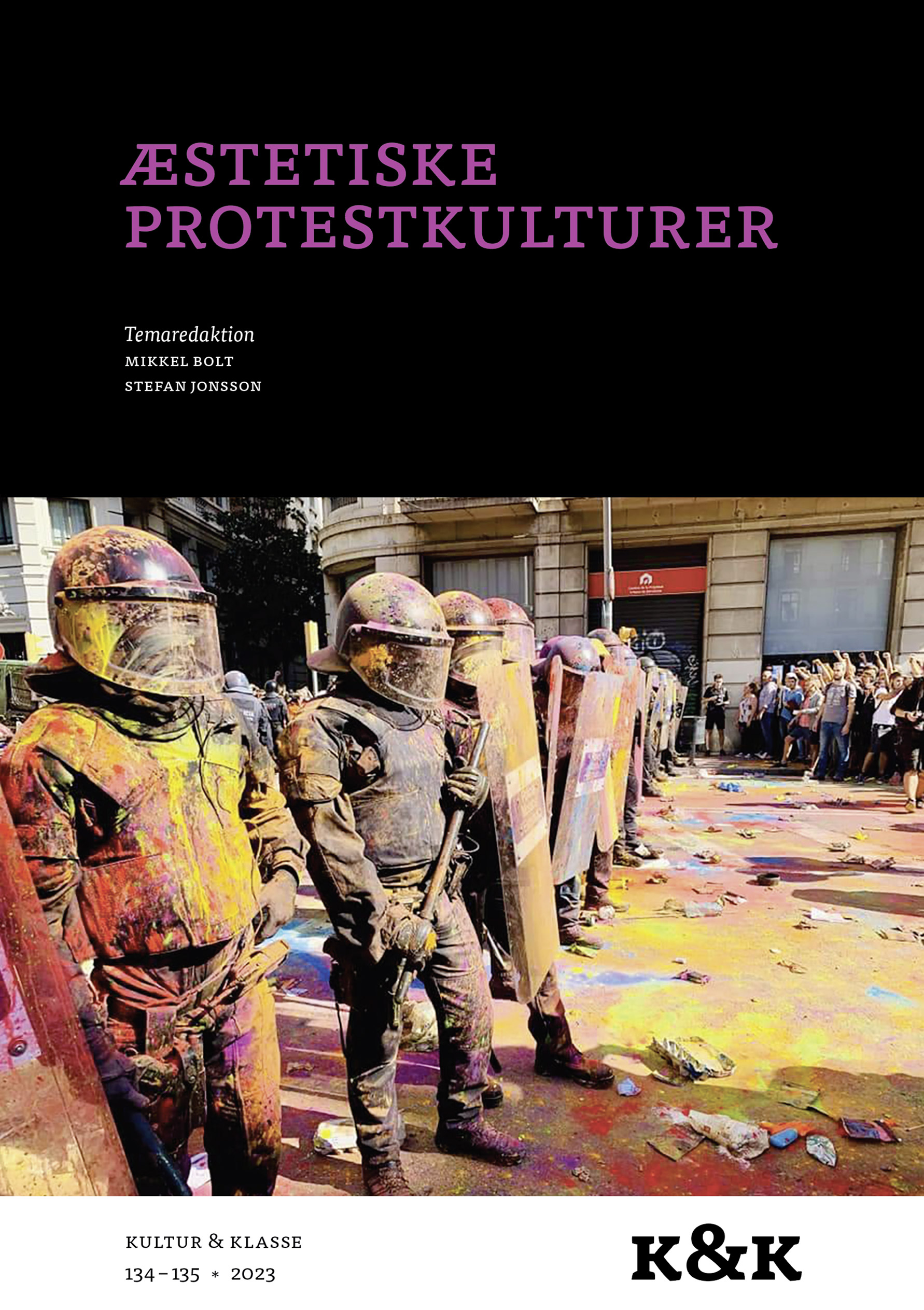Upploppet som det absoluta konstverket
DOI:
https://doi.org/10.7146/kok.v51i134-135.137187Nøgleord:
Protester, upplopp, estetik, autonomi, Adorno, MarxResumé
In this article, we suggest that the notion of “aesthetic cultures of protest” can be understood as designating two broad tendencies in the contemporary field of art and politics: on the one hand, the incorporation of the protest by the art world and, on the other hand, the appropriation of aesthetic traits by social protests. To counteract the ethical immediacy of both, we turn to Theodor W. Adorno’s more dialectical understanding of the relationship between protests and the aesthetic. After being marshalled against art’s internalisation of protest, and the protests’ appropriation of the aesthetic, we assess Adorno’s notion of form and autonomy through an immanent critique that is both conceptual and historical. We argue that Adorno’s aesthetics lacks an understanding of social labour, to which it itself ascribes great conceptual significance, and that recent changes in the global composition of capital and labour has affected the role of social labour in such a way that Adorno’s tendency to identify art’s autonomy with its negativity can no longer be upheld. Finally, we argue that the characteristics, which Adorno ascribes to the work of art has migrated to, and been realised by, a form of protest which reemerged simultaneously with the death of Adorno, namely the riot.
Referencer
Adorno, Theodor W. ”Engagemang”, övers. Lars Bjurman. Res Publica 32/33 (1996): 95-111.
Adorno, Theodor W. Estetisk teori, övers. Sven-Olov Wallenstein. Göteborg: Glänta produktion, 2019.
Adorno, Theodor W. ”Gesellschaft”. Gesammelte Schriften Bd 8, Soziologische Schriften I, Suhrkamp, 1970, s. 9-19.
Adorno, Theodor W. ”Marginalanteckningar om teori och praxis”, övers. Anders Bartonek, Fronesis, nr. 29/30, 2009, s. 199-218.
Adorno, Theodor W. ”Spätkapitalismus oder Industriegesellschaft”. Gesammelte Schriften Bd 8, Soziologische Schriften I, Suhrkamp, 1970, s. 354-370.
Arrighi, Giovanni. Det långa 1900-talet: Om makt, pengar och kapitalets globalisering, övers. Gunnar Sandin, Daidalos, 1996.
Arthur, Christopher J. The New Dialectic and Marx’s Capital, Brill, 2002.
Benanav, Aaron. Automation and the Future of Work, Verso, 2020.
Bernes, Jasper. ”Logistics, Counterlogistics and the Communist Project”, Endnotes nr. 3, 2013, s. 172-201.
Bishop, Claire. Artificial Hells. Participatory Art and the Politics of Spectatorship, Verso, 2012.
Bourriaud, Nicholas. Esthétique relationnelle, Les Presses du réel, 1998.
Brenner, Robert. The Economics of Global Turbulence. The Advanced Capitalist Economies From Long Boom to Long Downturn, 1945–2005, Verso, 2006.
Clover, Joshua. Upplopp. Strejk. Upplopp. Kapitalismens kris och de nya revolterna. Översättning Oskar Söderlind och Johannes Björk, Tankekraft förlag, 2019.
Debord, Guy. ”Varuskådespelssamhällets nedgång och fall”. Brand, nr. 3, 2013,s. 47-57.
Endnotes. ”An Identical Abject-Subject”. Endnotes, nr. 4, 2015, s. 276-301.
Fisher, Mark. ”Aesthetic Poverty”. K-Punk. The Collected and Unpublished Writings of Mark Fisher (2004–2016), Repeater, 2018.
Foster, Hal. The Return of the Real. The Avant-Garde At the End of the Century, The MIT Press, 1996.
Hardt, Michael och Antonio Negri, Imperiet. Översättning Henrik Gundenäs m.fl., Glänta/Vertigo, 2003.
Hardt, Michael och Antonio Negri. Multituden. Krig och demokrati i imperiets tidsålder. Översättning Oskar Söderlind, Tankekraft förlag, 2007.
Max Horkheimer och Theodor W, Adorno. Upplysningens dialektik. Filosofiska fragment. Översättning Lars Bjurman och Carl-Henning Wijkmark, Daidalos, 1996.
Johansson, Anders. ”Vad var kritiken?” K&K – Kultur og klasse, nr. 122, 2016, s. 125-142.
Kestner, Grant. Conversation Pieces. Community and Conversation in Modern Art. Andra upplagan, University of California Press, 2013.
Lindblå, Fredrik. ”Från tåg till parad”. Glänta, nr. 2-3, 2013, s. 147-154.
Martin, Stewart. ”The absolute artwork meets the absolute commodity”. Radical Philosophy, nr. 146, 2007, s. 15-25.
Marx, Karl. Kapitalet. Första boken: Kapitalets produktionsprocess. Översättning Ivan Bohman, Cavefors/Zenit, 1970.
Mohandesi, Salar. ”Class Consciousness or Class Composition.” Science & Society, nr. 1, 2013, s. 72-97.
Negri, Antonio. ”Metamorphoses”. Radical Philosophy, nr. 149, 2008, s. 21-25.
Postone, Moishe. Time, Labor, and Social Domination. A Reinterpretation of Marx’s Critical Theory. Cambridge University Press, 1993.
Rancière, Jacques. ”Aesthetic Separation, Aesthetic Community.” The Emancipated Spectator, översättning Gregory Elliott, Verso, 2009, s. 51-82
Roberts, John. The Intangibilities of Form: Skill and Deskilling of Art After the Readymade. Verso, 2007.
Sartre, Jean-Paul. Vad är litteratur? Översättning Mario Grut, Partisan, 1970.
Spaulding, Daniel. ”A Clarification on Art and Value” Mute, 28 maj 2015, https://www.metamute.org/editorial/articles/art-value-and-freedom-fetish-0. Nerladdad 17 december 2022.
Thompson, Edward Palmer. ”De engelska massornas moraliska ekonomi.” Översättning Lars Magnusson, Brand, nr. 3, 2013, s. 178-238.
Žmijewski, Artur. ”Foreword”. Forget Fear. Redigerad av Joanna Warzsa och Artur Žmijewski, Verlag der Buchhandlung Walter König, 2012.
Downloads
Publiceret
Citation/Eksport
Nummer
Sektion
Licens
Tidsskriftet følger dansk ophavsret.





